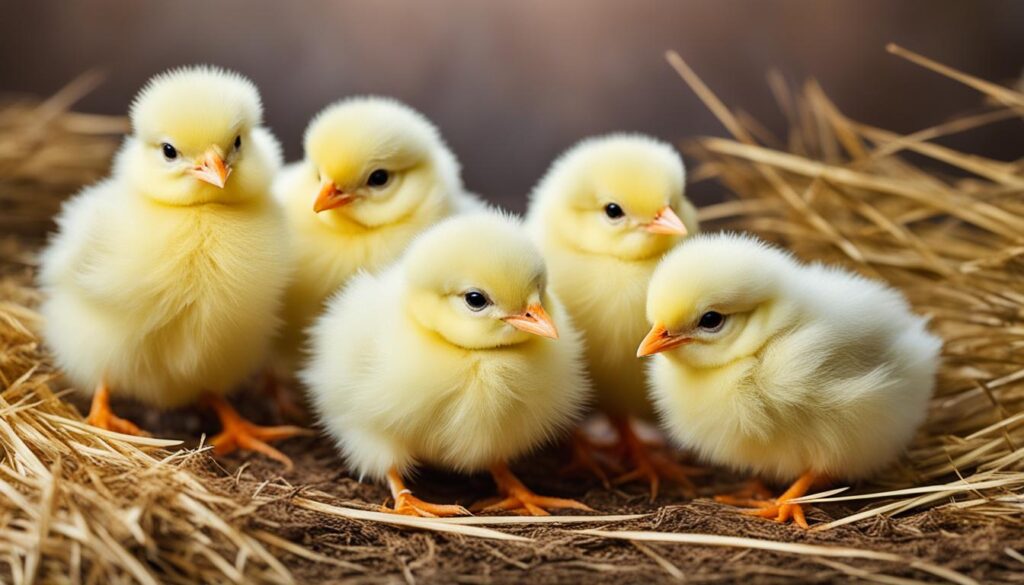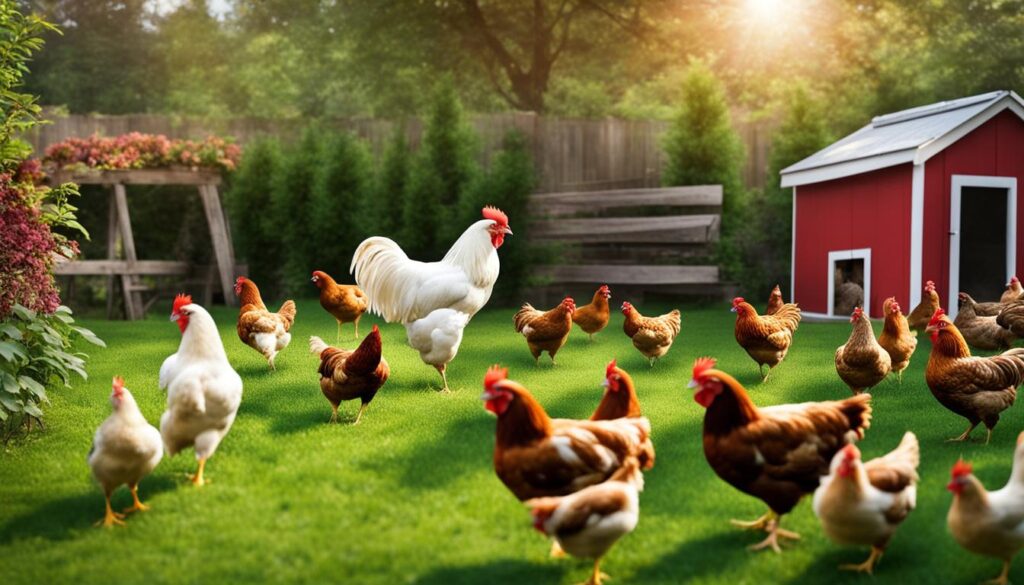As a passionate backyard poultry enthusiast, I’ve often pondered the question: Are Tractor Supply chicks vaccinated? The health and vitality of my flock are paramount, so understanding where my chicks come from and what health measures have been taken is crucial. In the broader realm of poultry care, preventative measures such as vaccination are pillars of sustainable husbandry. It’s no understatement to say that the health framework established by suppliers can significantly impact our backyard endeavors.
My journey into poultry keeping has taught me that the web of chick health at Tractor Supply extends far beyond what meets the eye. To that end, diving deep into the vaccination status of Tractor Supply chickens vaccinated helps us ensure the seamless integration and overall well-being of our feathered friends. And I’m here to share with you all that I have learned.
Key Takeaways
- Understanding the vaccination status of chicks is essential for healthy flock integration.
- The approach Tractor Supply takes towards chick health influences your purchase decision.
- Vaccination can provide a safety net against common poultry diseases.
- Researching supplier health policies underscores responsible hobby farming.
- Knowing the care Tractor Supply invests in their chicks can set your mind at ease.
- Insights into vaccination practices can guide your backyard poultry management strategies.
Understanding Tractor Supply’s Chick Health Policies
As a dedicated hobby farmer, knowledge about where my chicks come from and how they’ve been taken care of is paramount. It’s not just about ensuring that Tractor Supply chick health measures meet industry standards; it’s about peace of mind, knowing that the chicks I bring home won’t introduce diseases to my established flock. It’s essential to inquire, “does Tractor Supply vaccinate their chicks?” as part of my responsibility towards my poultry’s welfare.
I’ve scoured through health policies for poultry at Tractor Supply to understand their stance on vaccinations and health measures. As you can see below, I’ve summarized their approach in a table that compares essential aspects of their health policies. It’s critical for us as consumers to be informed about these practices, ensuring we make the best choices for our backyard companions.
| Health Measure | Description | Tractor Supply Policy |
|---|---|---|
| Vaccinations | Preventative care against common poultry diseases | Standard vaccinations administered |
| Screening | Assessing chicks for signs of illness before sale | Regular health checks conducted |
| Feed | Quality and type of starter feed provided | Non-medicated, nutrient-rich feed used |
| Housing | Living conditions at retail locations | Spacious and clean environments maintained |
| Supplier Standards | Requirements for chick suppliers | Suppliers must adhere to biosecurity measures |
In my quest for clarity, I’ve observed that Tractor Supply generally has comprehensive policies in place, aimed at selling healthy, vaccinated chicks. Most locations follow a structured protocol to ensure the chicks receive proper care before they end up in our backyard coops.
However, it’s always a good idea to engage with Tractor Supply staff directly or consult their official resources for the most current information. By staying informed, we’re not only protecting the health of our chicks but also investing in the productivity and joy that come from raising a robust, happy flock.
Does Tractor Supply Vaccinate Their Chicks
As someone who deeply cares for the health and safety of my backyard flock, I understand the gravity of ensuring proper vaccinations. The looming question among many of us who keep chickens is: does Tractor Supply vaccinate their chicks? The responsibility Tractor Supply holds in this regard is huge, considering they are the go-to source for many to purchase their chicks.

Exploring the Types of Vaccinations Offered
When discussing tractor supply chicks vaccinated, the kind of vaccinations that are provided makes all the difference. Chicks can be vaccinated against common diseases that would otherwise be detrimental to their health. Here’s what I’ve found out directly from Tractor Supply and experienced professionals in poultry health:
- Marek’s Disease Vaccine
- Coccidiosis Vaccine
- Newcastle Disease Vaccine
- Infectious Bronchitis Vaccine
The Importance of Vaccines in Poultry Health
Poultry vaccines are not merely a formality; they are a fundamental aspect of poultry health. Vaccinations serve as the frontline defense against infectious diseases that can sweep through a flock. Not only do they help to prevent the spread of illness among poultry, but they also contribute to the overall biosecurity measures necessary in maintaining a healthy and productive flock.
How Vaccinations Affect the Chicks You Take Home
When we bring home a group of tractor supply chicks vaccinated, we’re not only bringing home pets or future egg layers; we’re also introducing new life into our existing ecosystem. Vaccinations at the early stages can signficantly impact their resilience against sickness and their integration with other birds. A well-vaccinated chick is more likely to develop into a strong, disease-resistant bird that contributes positively to your backyard flock’s dynamic.
| Vaccine | Disease Protected Against | Impact on Chick Health |
|---|---|---|
| Marek’s Disease Vaccine | Marek’s Disease | Increases resistance to a widespread viral disease causing tumours and paralysis |
| Coccidiosis Vaccine | Coccidiosis | Reduces the risk of a common intestinal tract infection |
| Newcastle Disease Vaccine | Newcastle Disease | Prepares the immune system to combat this highly contagious viral disease |
| Infectious Bronchitis Vaccine | Infectious Bronchitis | Shields against a respiratory disease that affects performance and egg production |
The vaccine schedule for chicks at Tractor Supply may shift depending on disease prevalence and veterinary advice. It’s important for us hobby farmers to be informed and ask the right questions before a purchase. Understanding the groundwork laid by chick vaccinations is essential to safeguarding our backyard flocks’ health and happiness.
Deciding If Tractor Supply Chicks Are Right for Your Flock
When it comes to choosing Tractor Supply chickens, hobby farmers like myself are often faced with a multitude of factors to consider. One of the first and perhaps most important considerations is how these chicks will integrate into our existing setups. In this section, we’ll discuss the important elements that guide this decision, aiming to ensure the optimal backyard flock health and longevity.
**Integrating Vaccinated Chicks**
Integrating vaccinated chicks into your backyard flock can be crucial in maintaining flock health. It’s not just about avoiding current problems, but also investing in the future well-being of your birds. But before moving ahead with your purchase, here’s how I evaluate my choices:
- Local disease prevalence: What diseases are common in my area, and will the vaccinations from Tractor Supply cover those?
- Flock health status: Is my current flock healthy, and how might new chicks affect that balance?
- Compatibility: Does Tractor Supply’s breed selection complement the breeds I already have?
These questions help me to weigh the pros and cons carefully, ensuring that any new addition is beneficial to my flock’s collective health and productivity.

**Key Considerations for Your Choice**
| Vaccination Benefits | Flock Compatibility | Local Disease Risks |
|---|---|---|
| Increased immunity against common illnesses. | Ensuring that new chicks match the temperament and size of the existing flock. | Understanding area-specific diseases helps in deciding the necessity of vaccinations. |
| Long-term health and productivity of the flock. | Assessing breed dynamics that affect pecking order and cohesion. | Potential to bypass prevalent diseases with vaccines offered by Tractor Supply. |
| Reduction in potential veterinary costs. | Considering genetic diversity for a robust flock. | Evaluating Tractor Supply’s vaccine offerings against local disease history. |
As we consider the various factors in choosing Tractor Supply chickens, it’s not just about today’s needs, but also the future of our homesteads. Whether you’re new to poultry keeping or an experienced hobby farmer, remember to take a holistic view of your flock’s well-being, keeping in mind that the health of each bird contributes to the overall success of your poultry endeavors.
Managing the Health of Your Backyard Chickens
The journey of nurturing a backyard chicken flock is highly rewarding, yet entails a significant commitment to their health and well-being. Since the integrity of your flock can hinge on the initial health of the chicks you choose, it’s imperative to consider if your young poultry are safeguarded against common diseases. Are Tractor Supply chickens vaccinated? Let’s explore this key aspect and delve into pivotal care strategies that can help your chickens thrive in their new home environment.
Benefits of Choosing Vaccinated Chicks
I’ve observed that starting with vaccinated chicks can create a buffer against potential outbreaks that could devastate an unprepared flock. The benefits of vaccinated chicks are substantial; they are more likely to grow into resilient birds, maintaining robust health and demonstrating increased productivity, whether that’s in terms of eggs or simply as vivacious members of your backyard ecosystem. It’s an investment that, while not foolproof, adds a layer of protection, contributing significantly to the flock’s collective immunity.
Best Practices for At-Home Poultry Care
Caring for your chickens extends beyond the coop and directly into your daily routine. My adherence to backyard chicken care best practices has been crucial. This encompasses providing a nutrient-rich diet, consistent fresh water access, clean and spacious living conditions, and a safe environment to thwart predators. Remember, even the best care cannot replace the head start that vaccinated chicks receive, but it is undoubtedly the foundation for a long and healthy life for your chickens.
Recognizing Signs of Illness in Your Flock
As someone who has raised chickens for years, I know firsthand how quickly illness can spread in a flock. It’s vital to familiarize yourself with the signs of poultry illness, which can range from lethargy, loss of appetite, abnormal droppings, to respiratory distress. Being vigilant and proactive in identifying these symptoms can make a significant difference in containing illnesses and ensuring the swift recovery of your birds. Through attentive care and observation, you can maintain a hearty flock and enjoy the multitude of pleasures that come with backyard chicken farming.
